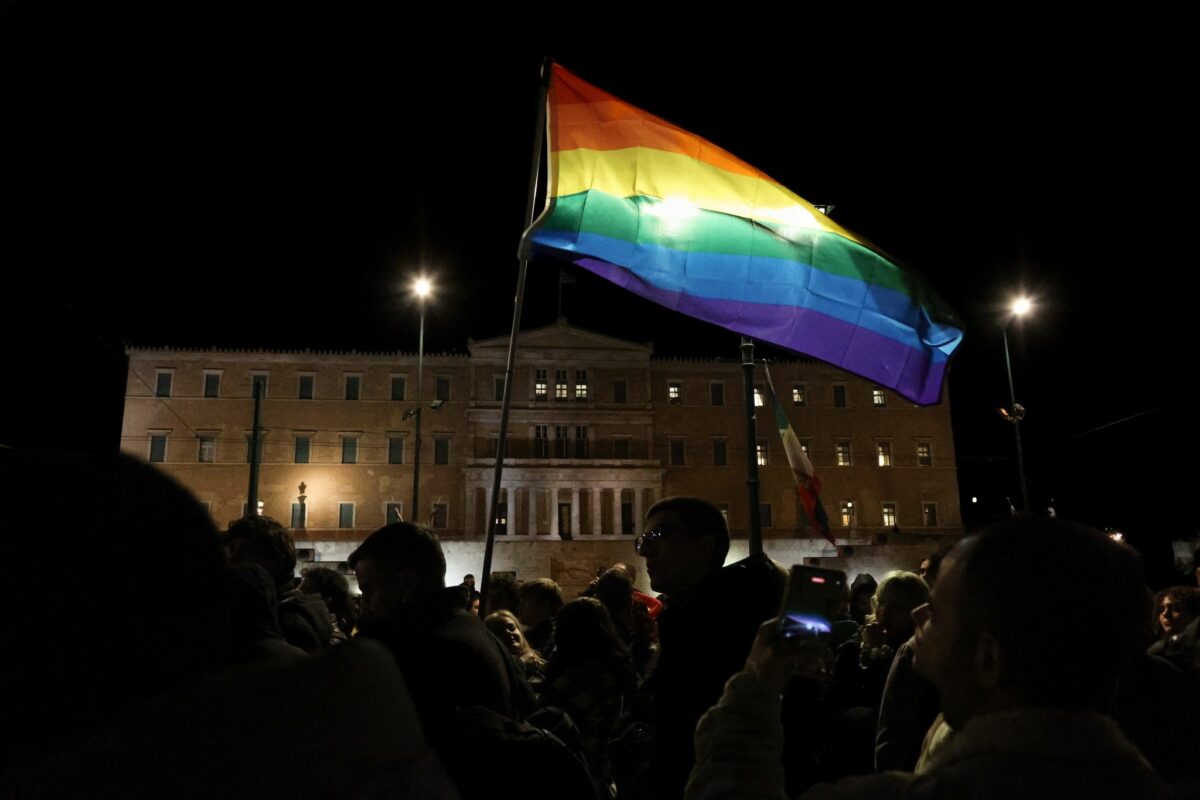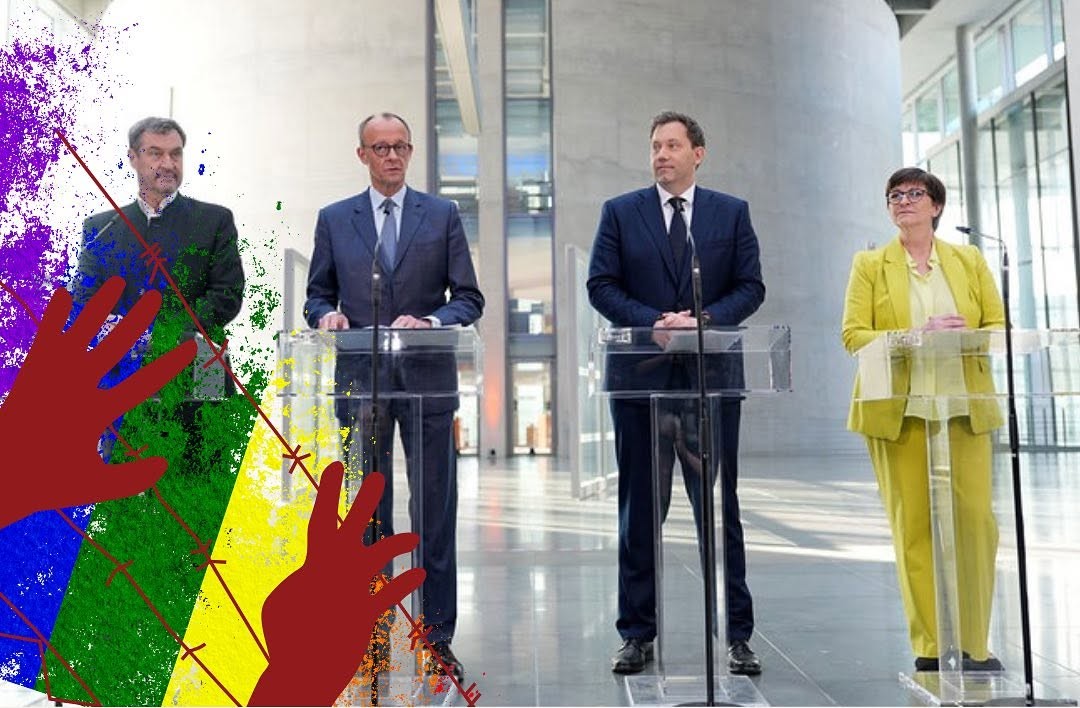On the 15th of February 2024 the Greek parliament passed law nr.5089/2024, legalizing same sex marriage and provisions for the families of same sex people. The LGBTQ+ community in the country now find themselves a step closer to equality before the law and the state. Despite a fierce reaction from the church and the far right (including members of the governing party), the vote was clear with 176 out of 300 MPs for the law. Greece has now become the first Christian orthodox country to do so. At the same time, the LGBTQ+ people speak of a limited victory.
Without a doubt, any debate on same-sex marriage and same-sex adoption in the House of Representatives is a victory for LGBTQ+ people and for the entire movement against sexism and homophobia. Opening up the issue of legalizing demands for equality in marriage and family regulations, which until some years ago were a taboo and were excluded as “unthinkable” or worse, part of the “political correctness frenzy” is a victory itself. And it did not fall from sky. It was the result of efforts and struggles of the LGBTQ+ movement and its allies. These struggles are far from over.
How did we arrive at this reform?
Prime Minister Kyriakos Mitsotakis speaks of a gracious and necessary reform “reflecting today’s Greece — a progressive, and democratic country, passionately committed to European values”. What he does not mention is that one third of his party MPs either abstained or voted against the law, including several ministers and former PM Antonis Samaras. The law evidently passed with the votes of the center left parties Syriza, PASOK, Nea Aristera (the recent split of Syriza), and “Plefsi Eleftherias”. The ruling party appeared deeply divided, with the majority justifying the necessity of equal marriage as a “humanistic gesture” and downgrading its political meaning, by arguing that the traditional values of Christianity and nuclear family will not be threatened, as the far right and the fascists claimed. In the time leading up to the vote of the draft, Orthodox church party “Niki”, nationalist “Greek Solution” and the fascist “Spartans”, along with the right wing opposition inside the government had been shouting about the imminent demolition of Orthodoxy and the demise of the traditional family. They organized rallies, which, despite strong subsidies from the Church, were not significant and moreover spread hate speech, including talk of “perversity” and even “pedophilia being encouraged by equality in marriage”!
From this point of view, the passing of the law is a blow against them and reveals both the crisis inside the ruling party and the danger of far right demagogy.
The Communist Party of Greece, KKE, unfortunately but not unexpectedly voted against the law, on the grounds that marriage will legitimize LGBTQ+ families which, according to them, is unnatural for the children who, “ought to have a mother and a father” (and not 2 mothers or 2 fathers). This decision can be explained by KKE’s commitment to Stalinism and to its adherence to “traditional values” as a counterweight to capitalist globalization. But for many of its newly attracted voters, it was both a big disappointment and a concession to homophobia, through its embrace of the argument of “normal and abnormal” families. It made obvious that KKE may sound left-wing and militant, but at the end of the day it will not defend the oppressed and their rights.
A history of struggles
What was not said either is that the demand for equality in marriage was the fruit of many years of LGBTQ+ (and their allies’) struggles. A decisive action was taken in 2008, with the “Tilos marriages”, when two same-sex couples proceeded to a civil marriage under the approval of the progressive mayor in the island of Tilos and, despite Greek law not foreseeing such a partnership, they brought the case to the European court and succeeded to create a “fait accompli”. There is a long trajectory of queer activism, militancy and demands, as there is an LGBTQ+ movement rooted inside Greek society. This movement has pressed all Greek governments for democratic reforms and for measures against sexism and homophobia, and for the rights and lives of LGBTQ+ people.
A first victory was the Civil Partnership law in 2015 and the second the Gender Identity Recognition in 2018, both introduced by the government of Syriza. Nevertheless, both laws, despite being steps forward, contain a series of faults and misinterpretations, which still deprive LGBTQ+ citizens from several rights. The LGBTQ+ community had patiently investigated and submitted the required amendments which, if they had been incorporated into the new law for equality in marriage, could have made it a complete achievement for the everyday lives of queer citizens. However, the new law lies far from the fulfilment of such expectations. It brings some good reforms, but lacks full access for LGBTQ+ people to democratic rights.
Some areas that are still lacking:
- According to the law, marriage is foreseen only for “same-sex persons” and not for “persons of any gender”, which should be in the accordance of real equality and inclusion of all LGBTQ+ persons.
- Parenthood for the families of trans people is not protected, because the bill does not allow for the amendment of the civil registration records of the children of trans people, once a gender recognition act has taken place, so that they can be consistent with the new data of their parents. Therefore, the kids of trans people are bound to the “dead” data of their parents.
- Same-sex couples are excluded from medically assisted reproduction (and therefore access to surrogacy). Since 2002, assisted parenthood through surrogacy is not only allowed in Greece, but also facilitated via a series of laws that encourage “surrogate tourism”, either for the purpose of having children by surrogacy or for immigrant women (mostly from Eastern Europe) to work as surrogate mothers. The entire surrogacy question is debated in the country, but what is irrelevant to the recent marriage law is that it retains the exclusion of same sex couples, revealing that it’s not surrogacy in question, but queer people as parents.
- Requested provisions to allow non-binary people who do not identify as either male or female to obtain official documentation reflecting their gender identity, including the “other” option, have not been included in the law.
- Finally, the main anticipated benefit of equality in marriage – resolving the cases of child custody in LGBTQ+ families – is undermined by the fact that same sex couples can not establish parental rights based on “presumption of parenthood”, such as the “presumption of paternity” that exists for heterosexual couples.
The main reason for the above faults is not ignorance but that, like the previous laws, this one also was the result of compromises and bargains with the Church, the far right, and the political establishment. On one hand, Greek society has advanced to accept diversity in sexual orientation and gender identity, and this sets pressure for legislative measures to protect LGBTQ+ people. But on the other hand, religion, family values, and heteronormativity are cornerstones of how Greek capitalism has developed so far. The kernel family of father – mother, children and/or grandparents – is an institution too established for an elected government to challenge. The government of Syriza made compromises as well, delaying the introduction of marriage equality, and allowing the right wing New Democracy to present itself as democratic and for “European” values.
These inefficiencies were brought to the attention of the left opposition, with the expectation that Nea Aristera, Syriza and/or PASOK would try pressing the government to adopt the modifications proposed by the LGBTQ+ organizations, especially because the governing party was divided and depended on the vote of the opposition. Unfortunately, this did not happen. Syriza and PASOK kept quite a low profile, criticizing the government on the one hand, but confirming that “the law shall be voted” on the other, resulting to New Democracy escaping its inner problems. The fact that the last six weeks, approaching the one year anniversary of the horrible train accident at Tempi, the government is shaken by anger on justice not being delivered, coupled with turmoil in education against its latest draft bill for private universities, was not used by the opposition. At the same time, the Communist Party’s opposition was evidently aligned with the far right homophobic rhetoric. In the lack of left wing challenge to New Democracy’s manoeuvres, passing the law appeared as the “best deal”, although it was not, and this is the reason why the LGBTQ+ movement speaks of “half” victory.
More important is that, at a rally outside the parliament on the day of the voting, all organizations spoke on the need to keep fighting in the streets and in society. This is the best guarantee that the reform far from pink-washing Kyriakos Mitsotakis and his government is only a step towards real liberation!
Dimitra Kyrillou ua a member of Proud Seniors Greece, Support group for LGBTQ+ people over 50 years.




